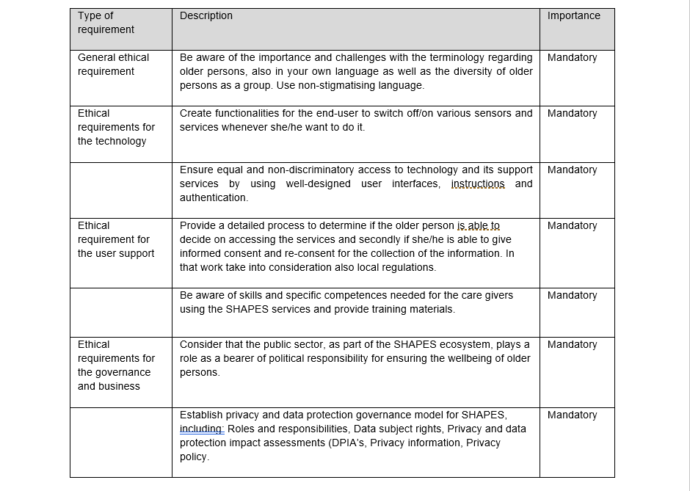What does ethics mean in research, development and innovation projects? Is the traditional research integrity sufficient enough or do we need other tools in order to create ethically sustainable services and operating models? The aim of this article is to present the ethical framework for the SHAPES integrated care platform.
 Photo by Artem Sapegin on Unsplash
Photo by Artem Sapegin on Unsplash
SHAPES in a nutshell
SHAPES project (the Smart & Healthy Ageing through People Engaging in Supportive Systems) Innovation Action is a project which aims to create new digital health and care solutions for older persons. The project intends to create a large-scale, EU-standardised open platform which integrates a range of technological, organisational, clinical, educational and societal solutions. As a result of the integration of practical and reliable digital solutions, the platform aims to facilitate long-term healthy and active ageing. The project is funded by EU Horizon 2020 co-funded programme, and it involves 36 partner organisations across Europe. (SHAPES, 2021.)
Ethics and new well-being services
New operating models enabled by digitalisation are gradually changing institutional structures and moral division of labour. In the context of well-being services, which have background on fundamental rights, it is particularly noteworthy who and what ultimately guide development and based on which values. The ethics work in the SHAPES project is to ensure that the SHAPES project becomes an ethically responsible endeavour, creating a positive innovation for its various end-users and service providers, as well as for society as a whole. Therefore, in addition to traditional research integrity, it is important to build an ethical framework for the SHAPES solution.
The SHAPES ethical framework
Values, principles and guidelines behind the framework
The principles and values of the SHAPES solution stem from the Charter of Fundamental Rights of the European Union, the Convention on the Rights of Persons with Disabilities, biomedical ethics, the ethics of care, and the capabilities approach. The main values and principles can be encapsulated to dignity, autonomy, participation, justice, equality, solidarity, and freedoms.
EU Fundamental Rights are the starting point for the design of the SHAPES solution. It entail 50 rights that are divided into the areas of dignity, freedoms, equality, solidarity, citizen rights and justice. (see separate article on EU Fundamental Rights and SHAPES)
The classical principles of biomedical ethics – justice, beneficence, non-maleficence and autonomy – provide a sound base for the ethics work in the context of well-being services. The ethics of care with is principles of empathy, relationships, and case uniqueness in turn further help bridge gaps between wellbeing services and engineering.
Central Human Capabilities complement EU fundamental rights -approach by providing insight to capabilities with are relevant for human beings, their dignity and freedom and which should be supported by SHAPES solution: 1) Life, 2) Bodily health, 3) Bodily integrity, 4) Senses, imagination and thought, 5) Emotions, 6) Practical reason 7) Affiliation 8) Other species 9) Play 10) Control over one’s environment.
The UN Convention on the Rights of Persons with Disabilities underlines that older persons, including persons with disabilities, ought to retain their right to make decisions and live independently and their right to be provided with adequate support and services to exercise their legal capacity. It also emphasizes the accessibility of the SHAPES services – including also economic accessibility. The underpinning principles for this are accessibility, dignity, individual autonomy and independence, non-discrimination, participation and inclusion, respect for difference acceptance and equality of opportunity.
These values, rights and principles relevant for both the older people and care providers are already able to guide the development of both technology and organizational solutions. However, even more precise ethics guidelines and requirements are needed to ensure that technology development and business modelling can apply ”ethics by design”. These guidelines include UN Sustainable Development Goals, Corporate Social Responsibility, Customer logic and Service Design, as well as Trustworthy Artificial Intelligence guidelines. The General Data Protection Regulation (GDPR) is used as a foundation when addressing data protection and cybersecurity requirements. (SHAPES Ethical Framework, 2021.)
Ethical requirements and code of conduct putting the framework in practice
In order to operationalize the values, principles and guidelines above, the SHAPES ethical framework finally depicts the ethical requirements and codes of conduct.
It is important to notice that SHAPES ethical framework with its ethical requirements and code of conduct has an impact not only on technical solutions and services, but also on organizational arrangements of SHAPES, including end-user support, governance, and business models of the ecosystem.
Alongside user requirements, ethical requirements are particularly important when developing and employing solutions linked to fundamental rights and when the target group is older persons. When adding new digital services to the existing SHAPES platform after the project, SHAPES ethical requirements offer a relatively quick way to check whether the new digital service and its organizational arrangements fulfil the ethical requirements. In the table 1, there are examples of ethical requirements for the technology, user processes and governance.
 Table 1: Examples of various types of ethical requirements (adopted from SHAPES Ethical Framework, 2021)
Table 1: Examples of various types of ethical requirements (adopted from SHAPES Ethical Framework, 2021)
SHAPES Code of Conduct
Code of conduct is a tool commonly used to establish a socially responsible organizational culture and behaviour especially among business. To be able to communicate the key aspects of the ethical framework and ethical requirements to different stakeholders, end-users and service providers, the SHAPES Code of Conduct has been created. That document articulates the values which concern technological development, user processes, business model, governance, and ecosystem with the aim of achieving high quality life.
The SHAPES Code of Conduct is divided into 7 topics :
- Empowerment and inclusivity of end-users
- Privacy, data protection and security
- Trustworthy artificial intelligence (AI)
- Communication and the use of terminology
- Sustainability, corporate social responsibility and customer logic
- Changing roles and the wellbeing of caregivers
- Impact assessment
The first version of the SHAPES Code of Conduct is presented as follows (SHAPES Code of Conduct, 2021). The code of conduct will be further developed based on the feedback received during the SHAPES project pilots.
Conclusions
The methodology related to the definition of ethical framework and ethical requirements is not yet well established in literature – at least if compared to the methodologies for defining user requirements. In addition, both the term ‘ethics’ or ‘ethical’ and the concept of ‘requirement’ are vague. Often, no distinction is made between the requirements of research ethics and the ethical requirements of the solution being developed (see, e.g., HORIZON2020 Ethical Self-assessment, 2019; Wittrock & Forsberg, 2019).
The approach described in this article is based on the ethics work developed during several Horizon 2020 projects, including INACHUS, WeLive, RANGER, and MARISA. Based on these experiences, it has been found that this approach to ethics helps to communicate the importance of ethics to technology partners as well as business modelers in a concrete and implementable way.
References: